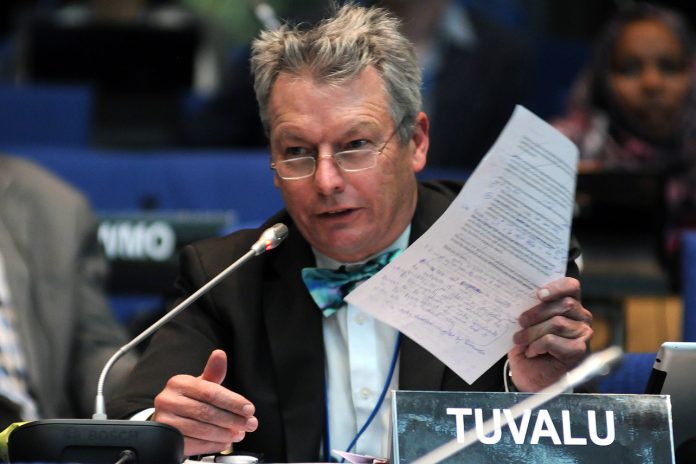The UN top rights body appointed an expert on climate change and human rights for the first time on Friday, a move that is expected to embolden environmental defenders and provide more support for victims of extreme weather.
The new Special Rapporteur position was formally created by the Geneva-based Human Rights Council in October at the same time as the body recognised access to a clean and healthy environment as a fundamental right.
The first to hold the post will be Ian Fry, who holds both Australian and Tuvaluan nationality. He has negotiated on behalf of least developed countries including at the 2015 Paris climate conference where he helped ensure that human rights were part of the final package.
Tuvalu, a tiny, low-lying Pacific nation, has been prominent in drawing global attention to the struggle against rising sea levels. Its foreign minister gave a video address to the United Nations climate change conference in Glasgow last year standing knee-deep in seawater. read more
The mandate of the new independent expert is to “study and identify how the adverse effects of climate change, including sudden and slow onset disasters, affect the full and effective enjoyment of human rights and make recommendations on how to address and prevent these adverse effects”.
In his letter stating his reasons for seeking the post, Fry stressed the need for action to help those forcibly displaced by extreme weather, having witnessed this first hand after Cyclone Pam in Tuvalu in 2015.
“I believe the displacement due to climate change is one of the greatest human rights threats confronting the international community,” he wrote.
Fry, who teaches environmental policy part time at an Australian university, was one of 26 candidates for the position, UN documents showed. The appointment is for three years.
The UN Human Rights Council on Friday recognised access to a clean and healthy environment as a fundamental right, formally adding its weight to the global fight against climate change and its devastating consequences.
The vote passed with overwhelming support, despite criticism in the lead-up from some countries, notably the United States and Britain.
The resolution, first discussed in the 1990s, is not legally binding but has the potential to shape global standards. Lawyers involved in climate litigation say it could help them build arguments in cases involving the environment and human rights.
“This has life-changing potential in a world where the global environmental crisis causes more than nine million premature deaths every year,” said David Boyd, UN special rapporteur on human rights and the environment, who called the decision a “historic breakthrough”.
The text, proposed by Costa Rica, the Maldives, Morocco, Slovenia and Switzerland, was passed with 43 votes in favour and 4 abstentions from Russia, India, China and Japan, prompting a rare burst of applause in the Geneva forum.
Britain, which was among the critics of the proposal in recent intense negotiations, voted in favour in a surprise, last-minute move. Its ambassador to the UN in Geneva, Rita French, said the UK was voting ‘yes’ because it shared supporters’ ambition to tackle climate change but added that states would not be bound to the resolution’s terms.
The United States did not vote since it is not currently a member of the 47-member Council.
Costa Rica’s ambassador, Catalina Devandas Aguilar, said the decision will “send a powerful message to communities around the world struggling with climate hardship that they are not alone”.
Critics had raised various objections, saying the Council was not the appropriate forum and citing legal concerns.
Environmental defenders had said Britain’s earlier critical stance was undermining its pledges ahead of the global climate conference it is hosting in Glasgow next month. read more
John Knox, a former UN special rapporteur, said ahead of the vote that those who had criticised the resolution were “on the wrong side of history”
The World Health Organisation estimates that some 13.7 million deaths a year, or around 24.3% of the global total, are due to environmental risks such as air pollution and chemical exposure.
Another proposal led by the Marshall Islands to create a new special rapporteur on climate change was also approved by the Council on Friday.
SOURCE: REUTERS/PACNEWS














